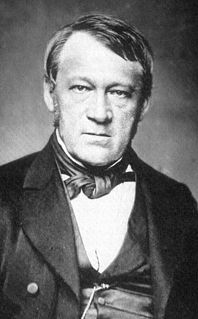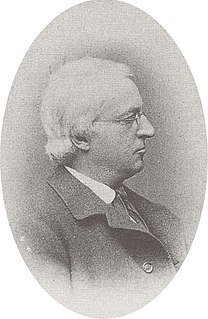
The Liniengeld was a historic road toll that had to be paid on entering the city of Vienna in Austria from the 18th century.

The Liniengeld was a historic road toll that had to be paid on entering the city of Vienna in Austria from the 18th century.
The Linienwall ("line(s) rampart") was built in the early 18th century as a simple fortification line around the outskirts of Vienna to protect the city from invading Turks and other raiders. On crossing the "line" (Linien) a toll, the Liniengeld had to be paid for each horse and wagon. This fee was charged each time someone entered the city which led to merchants and chamberlains, for example, both inside and outside the city boundaries, protesting that they had to pay the toll several times a day.
The historian, Leopold von Ranke, described the Liniengeld in his magazine, Historisch-politische Zeitschrift, as a "very important" source of income for the city of Vienna. [1]

Leopold Zunz was the founder of academic Judaic Studies, the critical investigation of Jewish literature, hymnology and ritual. Zunz's historical investigations and contemporary writings had an important influence on contemporary Judaism.

Heinrich Kiepert was a German geographer.

Leopold von Ranke was a German historian and a founder of modern source-based history. According to Caroline Hoefferle, "Ranke was probably the most important historian to shape [the] historical profession as it emerged in Europe and the United States in the late 19th century". He was able to implement the seminar teaching method in his classroom and focused on archival research and the analysis of historical documents. Building on the methods of the Göttingen School of History, he was the first to establish a historical seminar. Ranke set the standards for much of later historical writing, introducing such ideas as reliance on primary sources (empiricism), an emphasis on narrative history and especially international politics (Außenpolitik). Ranke also had a great influence on Western historiography. He was ennobled in 1865, with the addition of a "von" to his name.

Georg Waitz was a German medieval historian and politician. Waitz is often spoken of as the leadind disciple of Leopold von Ranke, though perhaps he had more affinity with Georg Heinrich Pertz or Friedrich Christoph Dahlmann. He concentrated on medieval German history.

Friedrich Drake was a German sculptor, best known for his huge memorial statues.
Hans Wolfgang Helck was a German Egyptologist, considered one of the most important Egyptologists of the 20th century. From 1956 until his retirement in 1979 he was a Professor at the University of Hamburg. He remained active after his retirement and together with Wolfhart Westendorf published the German Lexikon der Ägyptologie, completed in 1992. He published many books and articles on the history of Egyptian and Near Eastern culture. He was a member of the German Archaeological Institute and a corresponding member of the Göttingen Academy of Sciences.

Heinrich Friedjung was an Austrian historian and journalist.

The Linienwall was an outer line of fortifications for the city of Vienna, Austria, which lay between the city's suburbs and outlying villages. Constructed in 1704, it was razed in 1894 to make way for the Vienna Beltway.
The road toll was a historical fee charged to travellers and merchants in return for permission to use the roads and waterways of the country or state concerned. It was reinforced in the Holy Roman Empire by the law of Straßenzwang which meant that traders in certain goods had to use specified roads. In return, they were usually guaranteed safe passage under the right of escort or Geleitrecht. The road toll was widespread especially in medieval times, and, in addition to the payments from the staple rights, was an important source of income.
Friedrich Wilhelm Karl, Ritter von Hegel was a German historian and son of the philosopher Georg Wilhelm Friedrich Hegel. During his lifetime he was a well-known and well-reputed historian who received many awards and honours, because he was one of the major urban historians during the second half of the 19th century.
Ludwig Dehio was a German archivist and historian.
The historiography of Germany deals with the manner in which historians have depicted, analyzed and debated the History of Germany. It also covers the popular memory of critical historical events, ideas and leaders, as well as the depiction of those events in museums, monuments, reenactments, pageants and historic sites, and the editing of historical documents.

Carl Adolf Cornelius was a German historian. In the context of the 1848 revolutions he was elected to the Frankfurt Parliament in 1848/49, after which he switched from the schools sector to the universities sector and built a reputation as a church historian.

Rankenheim is a mansion on Zemminsee in Groß Köris, Brandenburg, approx. 50 kilometres south of Berlin. In Nazi Germany it was used as a camp for educating teachers. After 1945 it became a temporary hospital and eventually a place for "maladjusted children" during the GDR regime - it is now a youth village. The surrounding district of Groß Köris is called Rankenheim.
Otto Vossler was a German historian.
Ulrich Muhlack is a German historian.
Rudolf Vierhaus was a German historian who mainly researched the Early modern period. He had been a professor at the newly founded Ruhr University Bochum since 1964. From 1971, he was director of the Max-Planck-Institut für Geschichte in Göttingen. He became known for his research on the Age of Enlightenment.
Erich Marcks was a German historian.

Joseph von Kudler was an Austrian economist, jurist and academic.

Heinrich Johannes Hermann Ranke was a German Egyptologist who worked at the University of Heidelberg. He was forced to leave during the Nazi regime as his wife had Jewish ancestors. He worked during period at the University of Pennsylvania.